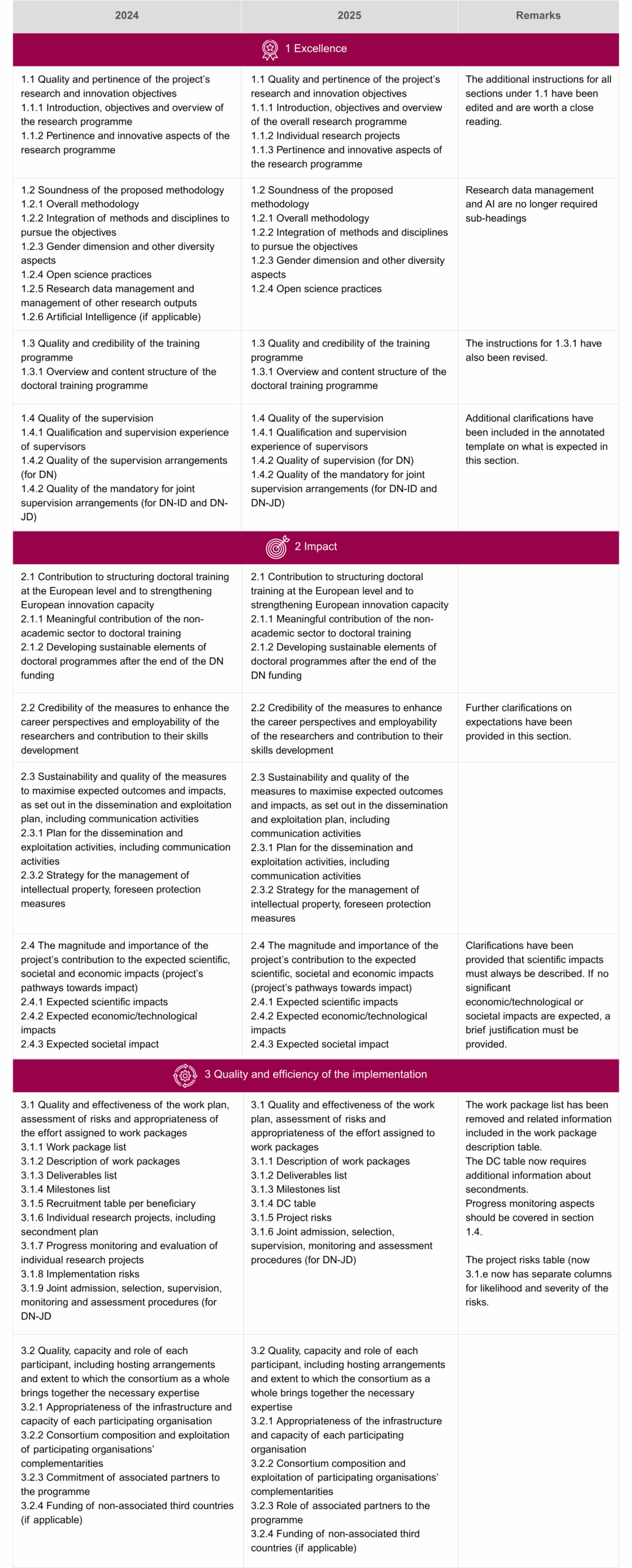MSCA 2025 Doctoral Networks – key changes to the proposal template for applicants to know
28th May 2025 at 2:23 pm
The MSCA 2025 Doctoral Networks (DN) call is now open, and the updated proposal template is available. While the overall objectives and structure of the call documents remain consistent with those of previous years, the 2025 template introduces important changes that applicants should consider when preparing their proposals. Based on the official Part B template and the Horizon Europe Work Programme 2023–2025, we highlight the most relevant modifications and their implications for project coordinators and partners.
Work Programme – more budget than expected
The revised MSCA Work Programme 2023-2025 was adopted on 15 May 2025. The changes to the previous version, adopted in 2024, are limited to a few concerning the DNs. However, one significant change is the indicative budget for the 2025 DN call, which has been increased from €458.66 million to €597.80 million. While this means the indicative budget is still a bit lower than for the 2024 call (€608.60 million), the expected success rate is not expected to drop as severely as previously anticipated.
Standard proposal template – significant changes to the Part B1 structure
The most significant changes of the DN 2025 call concern the standard proposal template, specifically Part B1. Notably, individual research projects must now be described in Section 1.1. Formerly, they had to be included in a specific table in section 3.1. Furthermore, a table is no longer required. Considering the page limit, which remains at 34 pages for Part B1, a table still might be the best solution to cover all the required information. Furthermore, research data management and artificial intelligence (AI) are no longer required subheadings in the methodology section. Nevertheless, if AI is used in the project, it should be appropriately described. Furthermore, the data management plan remains a mandatory deliverable.
In addition to the individual research projects moving, other notable changes in section 3.1 include the removal of the work package list and progress monitoring sub-headings, as well as important changes to some of the mandatory tables.

Furthermore, some annotations have been revised and are worth a thorough read.
How to start your DN proposal journey
Whether you are planning to submit a new or reapply a previously submitted proposal to this year’s DN call, make sure that you have the necessary documents ready. We also recommend that you regularly check the call on the EU Funding & Tenders Portal for important updates. You may also want to subscribe to our blog updates in the main area of our blog, as we regularly publish blog posts on Doctoral Networks and other Horizon Europe funding opportunities. As an Associated Partner in three Horizon Europe DNs currently in grant preparation (BioTransform, INT2ACT and PANIONS), seven ongoing DNs DarChem, MobiliTraIN, BREAKthrough, CONCISE, MITGEST, MIRELAI and SYNSENSO, as well as many successful H2020 ITNs, we at accelopment have gathered a great deal of practical experience in Proposal Writing, Project Management and Dissemination support as well as Transferable Skills Training all geared toward DNs. If you are interested in our support for your upcoming DN proposal, feel free to contact us.


